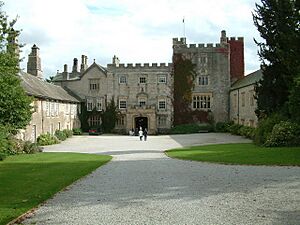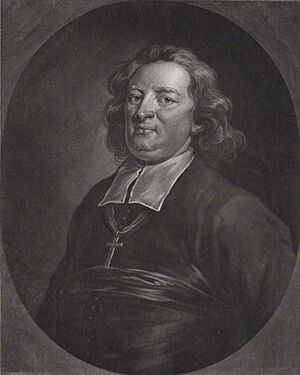Thomas Strickland (Cavalier) facts for kids
Sir Thomas Strickland (baptised 16 November 1621 – 8 January 1694) was an English politician and soldier. He lived during a time of big changes in England. He supported the King's side, called the Royalists, during the English Civil War. He was even made a knight for his bravery at the Battle of Edgehill.
After the King was brought back to power (this was called the Restoration), Sir Thomas became a Member of Parliament for Westmorland. He also worked for King Charles II and later King James II. When James II left England after the Glorious Revolution in 1688, Sir Thomas went with him to France. He passed away in Rouen six years later.
Contents
Sir Thomas Strickland's Life
Sir Thomas was the oldest son of Sir Robert Strickland. His family lived at Sizergh Castle. He went to St. Alban Hall, Oxford when he was 16. Then he studied law at Gray's Inn.
Fighting in the English Civil War
The English Civil War was a big conflict in England. It was fought between those who supported the King (Royalists) and those who supported Parliament. At the Battle of Edgehill, which was the first major battle, Thomas Strickland led a group of foot soldiers. His father, Sir Robert, led a group of horse soldiers. King Charles I was so impressed by Thomas's bravery that he made him a knight right there on the battlefield. This happened on 23 October 1642.
Life After the King's Return
After King Charles II returned to the throne, Sir Thomas became a Member of Parliament. He represented the county of Westmorland from 1661 until 1676. He was removed from Parliament because he was a Catholic. At that time, Catholics were not allowed to hold public office.
The Stricklands were a Catholic family. However, some historians believe Sir Thomas pretended to be a Protestant when he was first elected. He might have become openly Catholic later. A law called the Test Act was passed in 1673. This law made people in Parliament say that the King was the head of the Church. This made it impossible for Catholics to stay in Parliament. Sir Thomas was not very active in Parliament. He only spoke once. He did not even speak up to defend himself when they decided to remove him.
Staying Safe During Difficult Times
During a time known as the Popish Plot, Catholics were in danger. People thought Catholics were planning against the King. Sir Thomas was openly Catholic, so he was at risk. But because he was older and not well, people thought he was unlikely to be part of any plots. Also, he had always been loyal to the King.
When his home, Sizergh Castle, was searched for weapons, they only found some old pieces of his Civil War armour. To show his loyalty, he swore an oath to protect the King from all enemies, even the Pope. This helped keep him safe.
Working for the King and Exile
Sir Thomas was a trusted helper to King Charles II. He managed the King's personal money. He also became a member of King James II's special advisory group, the Privy Council.
When King James II lost his throne in 1688, Sir Thomas and his family went into exile with him. They lived with the exiled King's court in France until 1692. Then they moved to Rouen, where Sir Thomas passed away on 8 January 1694. He was buried there.
His oldest son, Walter, took over the family estates. Walter was able to get Sizergh Castle back. He did this by setting up a special arrangement where the land was temporarily given to Protestant neighbors. They later gave it back to him.
Sir Thomas Strickland's Family
Sir Thomas Strickland was married twice.
First Marriage
In 1646, Sir Thomas married Jane Moseley. She was from Yorkshire. Jane had two daughters with Sir Thomas who survived:
- Alice: She married Sir Walter Kirkham Blount. They did not have any children.
- Anne: She married John Middleton. They also did not have any children.
Second Marriage
Sir Thomas married Winifred Trentham (1645–1725). She was from Staffordshire. They had several children:
- Walter (1675–1715): He inherited Sizergh Castle.
- Robert (1679–1713): He never married.
- Roger (1680–1704): He worked for a French prince. Roger died when he was 24 and never married.
- Thomas (1682–1740): He became a Bishop of Namur. He was also an unofficial helper for the English government at the Vatican. He died in Namur in 1740 and was buried in his own church.
 | Emma Amos |
 | Edward Mitchell Bannister |
 | Larry D. Alexander |
 | Ernie Barnes |



